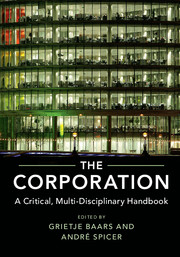Book contents
- Frontmatter
- Contents
- List of Contributors
- Acknowledgements
- Introduction: Why the Corporation?
- PART I DISCIPLINARY OVERVIEWS
- PART II INTERDISCIPLINARY THEMATIC CHAPTERS
- 1 The Evolution of the Corporate Form
- 2 The Multinational Corporate Group
- 3 The Financialization of the Corporation
- 4 Corporate Value Chains
- 5 Corporate Citizenship
- 6 The Corporation and Crime
- a The Criminal Corporate Person
- b The FBI on Corporate Crime: Examining the Influence of Corporate Culture
- c Mental Blockades in the Recognition of Mens Rea in Corporations
- 7 The Corporation and Ideology
- 8 Corporation and Communities
- 9 Corporations and Resistance
- 10 Alternatives to the Corporation
- Index
- References
c - Mental Blockades in the Recognition of Mens Rea in Corporations
from 6 - The Corporation and Crime
Published online by Cambridge University Press: 31 March 2017
- Frontmatter
- Contents
- List of Contributors
- Acknowledgements
- Introduction: Why the Corporation?
- PART I DISCIPLINARY OVERVIEWS
- PART II INTERDISCIPLINARY THEMATIC CHAPTERS
- 1 The Evolution of the Corporate Form
- 2 The Multinational Corporate Group
- 3 The Financialization of the Corporation
- 4 Corporate Value Chains
- 5 Corporate Citizenship
- 6 The Corporation and Crime
- a The Criminal Corporate Person
- b The FBI on Corporate Crime: Examining the Influence of Corporate Culture
- c Mental Blockades in the Recognition of Mens Rea in Corporations
- 7 The Corporation and Ideology
- 8 Corporation and Communities
- 9 Corporations and Resistance
- 10 Alternatives to the Corporation
- Index
- References
Summary
Introduction
Criminal responsibility of legal corporations is an inherently contested issue. In a famous contribution on the topic, written in 1957, Gerhard Mueller asserted that, while common law countries had embraced the idea of criminal liability for corporations and the US Model Penal Code contained explicit regulations, the majority of civil law states still adhered to the maxim societas delinquere non potest (Mueller, 1957–1958: 28). The reasons for this reluctance are not hard to grasp. Corporations are abstract entities that cannot ‘act’ or ‘think’ for themselves. Holding them criminally responsible would flout the classic criminal law requirements of actus reus and mens rea. Moreover – and closely related to the previous point – a corporation is insensitive to punishment, because it has ‘no soul to damn and no body to be kicked’.
Meanwhile, in half a century, opinions and legal practice have changed. Nowadays, it is fairly universally acknowledged that corporations can cause widespread mischief by producing disasters, extensive pollution and even by being complicit in war crimes. Borrowing from the solutions advanced in the common law tradition, many civil law systems have gradually introduced legislation on corporate criminal responsibility. They have tried to overcome the conceptual hurdles by identifying corporations with their organs or representatives, by imputing the latter's conduct and intentions to the corporation or by simply holding the ‘corporate culture’ responsible. Such initiatives have been prompted by the considerations that corporations sometimes gain huge profits at the expense of human happiness, that managers are often quite successful in hiding behind the corporate veil and that corporations can be painfully hurt. After all, they have ‘deep pockets’ and can be heavily fined; they are sensitive to loss of reputation; they can be excluded from all kinds of public benefits and tax exemptions; and they can, as a measure of last resort, even be dissolved. At the supra-national level such legislative activities are encouraged or even prescribed.
In spite of these developments, criminal corporate liability is still a problem nagging many people at the back of their minds. An important state like Germany is still adamant to keep corporations out of the grip of criminal law (Weigend, 2008). Moreover, corporate criminal responsibility is absent in all the statutes of the international criminal tribunals, including the Rome Statute.
- Type
- Chapter
- Information
- The CorporationA Critical, Multi-Disciplinary Handbook, pp. 399 - 409Publisher: Cambridge University PressPrint publication year: 2017

